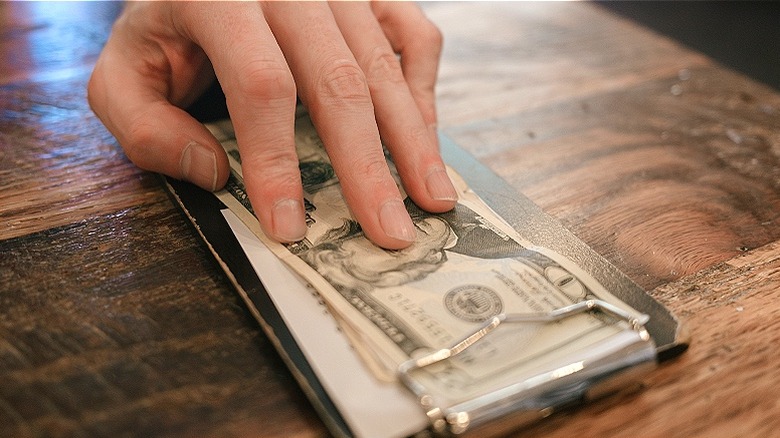Why Tipping Has Become An Election Flash Point In 2024
You might have read that both presidential candidates in 2024 have offered up plans to eliminate taxation on tips. This might leave you wondering why tips are taxed at all, or even wondering why the country would want to eliminate those taxes. The premise of eliminating taxes on tips was first introduced in early June of this year by former President Donald Trump as part of a new tax plan meant to help his bid for a second term in office. Shortly afterward, Texas Sen. Ted Cruz and Florida Rep. Byron Donalds (both Republicans) introduced the "No Tax on Tips Act" legislation with the aim of targeting the current Biden administration (when President Biden was still in the race).
After becoming the Democratic Party's nominee this summer, Vice President Kamala Harris also voiced support for the elimination of taxation on tips. This opens up the idea that, regardless of the outcome of the November election, chances are good this issue surrounding tipping and taxes will become a larger legislative topic in the following year. The policy is largely seen as a way to better help service industry workers who face low wages and rely on tips (our country has a dark history with tipping) despite demanding and necessary work.
Though economists are mixed on the potential outcomes of such a policy, the proposal has been particularly successful for both campaigns, with voter support and even union endorsements coming as a result. While it's difficult to remove the political motivations from this topic being introduced on the campaign trail, there are some significant economic factors to consider when deciding whether tips should be taxed.
Tips have been taxed for over 40 years
Before delving into the economic ramifications of eliminating the taxes currently levied on tips, it's important to look at why they were ever taxed in the first place. You might be surprised to learn that tips were not always taxed. In fact, tips only started to be taxed in 1982 when Congress enacted the Tax Equity and Fiscal Responsibility Act (TEFRA).
The president at the time, Ronald Reagan, proposed and pushed for the new legislation as a way to supposedly raise an additional $200 million per year (or, at the time, $1.6 billion over five years). In fact, it appears federal revenue was the primary consideration for implementing the taxation in the first place. In comparison, as of 2024, the Committee for a Responsible Federal Budget estimates a revenue shortfall of between $150 to $250 billion over the next decade should tips become exempt from both income and payroll taxes.
When TEFRA was enacted, the U.S. government estimated that roughly 84% of tip income was going unreported, meaning a loss in that revenue. Thus, TEFRA required employees to report their tip amounts directly to their employers in order for that income to be taxed as well. As reported by The New York Times at the time, restaurants were opposed to the idea initially due to the additional administrative bookkeeping work involved. Not to mention, most restaurant workers, who rely on tips to make a living and faced fewer take-home dollars as a result of TEFRA, also opposed it.
What are the downsides to the policy?
One of the issues with eliminating taxation on tips is the potential for loopholes and financial abuse. High earners or even employers could choose to reclassify regular wages as tips to take advantage of potential tax benefits. (Here, by the way, are effective ways to avoid paying taxes legally.) Without additional income limits or regulation on application, the policy could easily be exploited.
One other matter to note about the proposed No Tax on Tips Act is that it will only exclude tipped workers from federal income taxes, not from federal payroll taxes. However, many of the workers in these tipped occupations don't typically pay federal income tax anyway. According to The Budget Lab at Yale, there were roughly 4 million workers in tipped jobs in 2023 (equal to about 2.5% of all employment). Meanwhile, in 2022, 37% of those tipped workers didn't pay federal income tax due to their income levels being too low. This means the amount of workers who would be affected by this policy is actually quite small. Increasing minimum wage, which has been $7.25 since July 2009, or eliminating the tipped minimum wage would be more beneficial to more people.
While the political promise of additional take-home pay may be a winner at the polls, the logistical reality of eliminating taxation on tips would fail to help most low-wage workers in the country. Saru Jayaraman, president of One Fair Wage, said to The Wall Street Journal, "It's pandering to workers. It doesn't actually solve the problem of economic instability and poverty and struggles that most of these workers are facing right now." On that note, remember to tip your bartenders.


